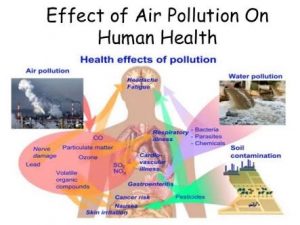Air Pollution Affects The Human Health
Air Pollution Affects the Human Health : Air pollution is a major concern in the new civilized world, which has a serious toxicological impact on human health and the environment. It has a number of different emission sources, but motor vehicles and industrial processes account for the major part of air pollution. Long and short-term exposure to airborne toxicants has different toxicological impacts in humans, including respiratory. Several reports have revealed the direct association between the exposure to poor air quality and an increasing rate of morbidity and mortality, mostly due to cardiovascular and respiratory diseases.
Air Pollution Affects the Human Health
Air pollution is considered a major environmental risk factor in the incidence and progression of some diseases, such as asthma, lung cancer, ventricular hypertrophy, Alzheimer’s and Parkinson’s diseases, psychological complications, autism, retinopathy, fetal growth, and low birth of weight. In this review article, we aimed to discuss the toxicology of major air pollutants, their sources of emissions, and their impacts on human health. We have also proposed the practical measures to reduce the air pollution in Iran.
Air Pollution Affects the Human Health
Air pollution is the black cloud belching from the industrial smokestack. It’s the smog that is settles over some cities, dimming the skyline. It’s the smelly exhaust of an old car that burns oil.
Air pollution can also be invisible and odorless. It can be cause lung damage, cancer or other serious health problems in people who may not realize the possible danger of the unseen gases or particles in the air.
The effects of the air pollution vary from person to person. A healthy adult who is exposed to these pollutants for a short time or at a low dose may not have long-term problems. For these people, even a small dose or short exposure can make symptoms worse. Longer exposure or a higher dose can be lead to serious illness. In some cases, it can lead to death.
Air Pollution Affects the Human Health
Air pollution affects people in different ways. Older people, children and those with pre-existing health conditions are more sensitive to the health impacts of the air pollution. In addition, the most deprived people in society often have poorer in health and less access to high-quality medical care, increasing their vulnerability.
Human activities have an adverse effect on the environment by polluting the water we drink, the air we breathe, and the soil in which the plants grow.
Without any doubt, the global environmental pollution is considered as international public health issue with multiple facets. Social, economic, and legislative concerns and lifestyle habits is related to this major problem. Anthropogenic air pollution is the one of the biggest public health hazards worldwide, given that it accounts for about 9 million deaths per year.
The long-term effects associated with the air pollution are chronic asthma, pulmonary insufficiency, cardiovascular diseases and cardiovascular mortality. According to the Swedish cohort study, diabetes seems to be induced after long-term air pollution exposure. Moreover, the air pollution seems to have various malign health effects in human.
The World Health Organization (WHO) reports on six major air pollutant, namely particle pollution, ground-level ozone, carbon monoxide, Sulphur oxides, nitrogen oxides. Air pollution can have the disastrous effect on all components of the environment, including groundwater, soil, and the air. Additionally, it poses the serious threat to living organisms. Acid rain, global warming, the greenhouse effect, and climate change have an important ecological impact on air pollution.
People exposed to the high concentrations of air pollutants experience disease symptoms and states of greater and lesser seriousness. These effects are grouped into short-term and long-term effects affecting health.
Susceptible populations that need to be aware of health protection measures include the elderly, children, and people with diabetes and predisposing heart or lung diseases, especially asthma.
Causes
- determining and characterizing whether air pollution has an effect on key reproductive factors and critical stages of development;
- determining the role of acute and chronic sociodemographic factors in health disparities caused by air pollution;
- Understanding how diet modifies responses to the air pollution;
- Evaluating long-term lifestyle and chronic disease effects on the air pollution-induced respiratory and cardiovascular responses.
Air pollutants and their toxicities
According to the World Health Organization (WHO), particle pollution, ground-level O3, CO, Sulphur oxides, nitrogen oxides and lead are the six major air pollutants that harm human health and also have the ecosystem.
There are many pollutants of suspended materials such as dust, fumes, smoke, mists, gaseous pollutants, hydrocarbons, volatile organic compounds (VOCs), polycyclic aromatic hydrocarbons and halogen derivatives in the air, which at high concentrations cause the vulnerability to many diseases, including different types of cancers.
Air pollution is considered a major environmental risk factor in the incidence and progression of some diseases such as asthma, lung cancer, ventricular hypertrophy, Alzheimer’s and Parkinson’s diseases, psychological complications, autism, retinopathy, fetal growth, and the low birth weight.https://www.apzem.in


